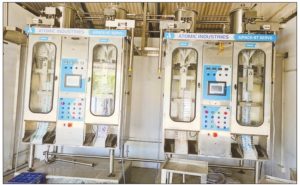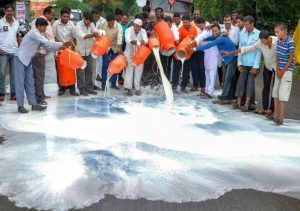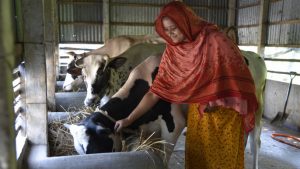Common dairy sector practices for the management of these calves are falling out of step with consumer values, according to 2018 Nuffield Scholar and veterinarian Sarah Bolton whose recent research was supported by Dairy Australia and the Australian Dairy Conference.
Managing a 300 cow farm with her partner in northern NSW, and also while previously working as a district vet with Local Land Services, Dr Bolton’s research was motivated by the challenges she faced.
“I became acutely aware of the image being put forward in terms of farm management,” she said.
“At first I approached it from a vet perspective looking into rearing techniques, health, biosecurity, husbandry, but then looked at it from a public trust and social licence preservation perspective.
“From the public’s perspective, dismissing surplus dairy calves as a waste product is troubling, while rearing them for beef can be a high-risk exercise for producers unless prices are particularly favourable.
“This led me to focus on looking for profitable options for producers that maintain public trust by prioritising animal welfare and value.”
Dr Bolton’s research explored novel approaches to the issue including the marketing of Jersey beef as a premium product based on eating quality.
“I focused on a lot of dairy producing countries that faced similar challenges to Australia … that were faced with the challenge of managing non-replacement dairy calves in line with public values and have found partial solutions to this challenge,” she said.
Dr Bolton said whilst prejudices exist against dairy beef in general, no other animal seems to have been so categorically rejected as uneconomical for beef as the male Jersey calf.
“In Denmark I largely looked at the utilisation of Jersey beef; they are very progressive, and proactive in addressing perceived low value purebred Jersey calves,” she said.
She visited suppliers of Thise and Ko, a branded jersey beef product.
“Non-replacement Jersey calves are reared through to weaning on the dairy farms, before being grown out and finished on the arable farms,” Dr Bolton said.
“Organic grain grown on farm is fed to the calves, while the composted bedding from winter housing is used as organic soil ameliorants.
“The resulting scheme sees the Jersey beef product marketed on quality not quantity; based on taste, tenderness and marbling, similar to Wagyu beef, and it is retailing for a higher price per kilogram than conventional beef, assuring profitability.
“The model also provides a low-risk option for arable farmers looking to diversify into livestock, requiring no investment in breeding stock and offering a guaranteed price for the product, as well as the ability to destock quickly if seasonal conditions deteriorate.”
Dr Bolton never intended to look into cow-calf separation as part of her research, until she stepped back and was looking at it from the public trust preservation perspective.
“As a veterinarian I had always been very convinced of the very clear benefits of separating dairy calves from the cows; to manage colostrum, diseases and stress caused by delayed separation,” she said.
“I visited seven dairy farms in the UK that were all rearing calves on their mothers, the largest being 120 cows the smallest about 20. What struck me was the condition of the calves – the Jersey calves easily could’ve passed as rolling fat Limousin calves.”
Despite harvesting significantly less milk, they were direct marketing based on production methods and making revenue from calves once they were finished.
“While rearing dairy calves on cows is not a perfect solution for every dairy producer, it is a practice deserving of more consideration and will be an exciting area for further scientific research,” Dr Bolton said.
Her research also explored conventional mechanisms to grow the market for dairy beef, like producer incentive schemes and sexed semen combined with targeted beef over dairy crossbreeding.
“The motivations are rarely ever there when it comes to rearing dairy beef at scale and there has never been huge uptake, combined with dairy beef discounts at the processing end of the supply chain,” she said.













